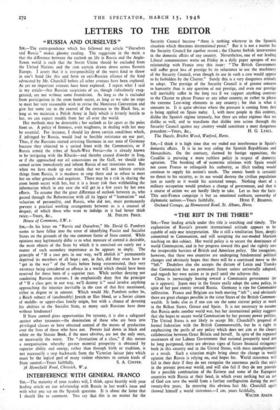" THE RIFT IN THE THREE "
Sul,—Your leading article under this title is searching and timely. The explanation of Russia's present international attitude appears to be capable of only ene interpretation. She is still a totalitarian State, deeply committed to Communism, and still accepting the out-moded Marxian teaching on this subject. Her world policy is to secure the dominance of world Communism, and in her progress toward this goal she rightly sees the insuperable barriers of British and American policy. She recognises, however, that these two countries are undergoing fundamental political changes and obviously hopes that there will be a continued move to the 'left." Doubtless also she accepts the dictum of Lenin and Trotsky that Communism has no permanent future unless universally adopted, and regards her own nation as in peril until she achieves this.
China is increasingly leaning toward a Communist government (or so it appears). japan may in the future easily adopt the same policy, in spite of her past enmity toward Russia. Germany is ripe for Communist infiltration. France and Belgium are both moving " left" ; and obviously there are great changes possible in the sister States of the British- Common- wealth. It looks also as if one can see the same sinister policy at work in the Balkan States, Greece and Spain. It is not necessary to assume that Russia_ seeks another world war, but her international policy suggests that she hopes to secure world Communism by her present power politics. The United States is not likely to accept Mr. Churchill's proposal of formal federation with the British Commonwealth, but he is right in emphasising the perils of any policy which does not aim at the closest collaboration between Great Britain and herself. In spite of the repeated assurances of our Labour Government that national prosperity need not be long postponed, there are obvious signs of future financial stringency both in this country and in the United States, with mass unemployment as a result. Such a situation might bring about the change in world opinion that Russia is relying on, and hopes for. World statesmen will fail in their duty if they do not recognise the enormous perils that exist in the present post-war world, and will also fail if they do not provide for a possible combination of the Eastern and some of the European countries with Russia at their head, in which event nothing but-an act of God can save the world from a further conflagration during the neat twenty-five years. In stressing this obvious fact Mr. Churchill again showed himself a world statesman.—I am, yours faithfully,
WALTER ANGUS


























 Previous page
Previous page